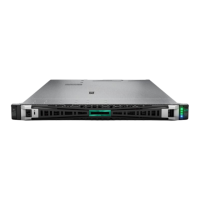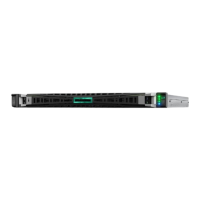• By default, the Trusted Platform Module is enabled as TPM 2.0 when the server is powered on after
installing it.
• In UEFI Mode, the Trusted Platform Module can be configured to operate as TPM 2.0 or TPM 1.2.
• In Legacy Boot Mode, the Trusted Platform Module configuration can be changed between TPM 1.2
and TPM 2.0, but only TPM 1.2 operation is supported.
CAUTION: An OS that is using TPM might lock all data access if you do not follow proper
procedures for modifying the server and suspending or disabling TPM in the OS. This includes
updating system or option firmware, replacing hardware such as the system board and hard drive,
and modifying TPM OS settings. Changing the TPM mode after installing an OS might cause
problems, including loss of data.
Procedure
1. From the System Utilities screen, select System Configuration > BIOS/Platform Configuration
(RBSU) > Server Security > Trusted Platform Module options.
2. Select an option. On servers configured with an optional TPM, you can set the following:
• TPM 2.0 Operation—Sets the operation of TPM 2.0 to execute after a reboot. Options are:
◦ No Action—There is no TPM configured.
◦ Clear—TPM is cleared during reboot, and TPM 2.0 Operation is set to No Action.
• TPM Mode Switch—Sets the TPM mode to execute after a reboot. Options are:
◦ No Action
◦ TPM 1.2
◦ TPM 2.0
• TPM 2.0 Visibility—Sets whether TPM is hidden form the operating system. Options are:
◦ Visible
◦ Hidden—Hides TPM from the operating system. Use this setting to remove TPM options from
the system without having to remove the actual hardware.
• TPM UEFI Option ROM Measurement—Enables or disables (skips) measuring UEFI PCI
operation ROMs. Options are:
◦ Enabled
◦ Disabled
3. Save your changes.
4. Reboot the system.
116 BIOS/Platform Configuration Options

